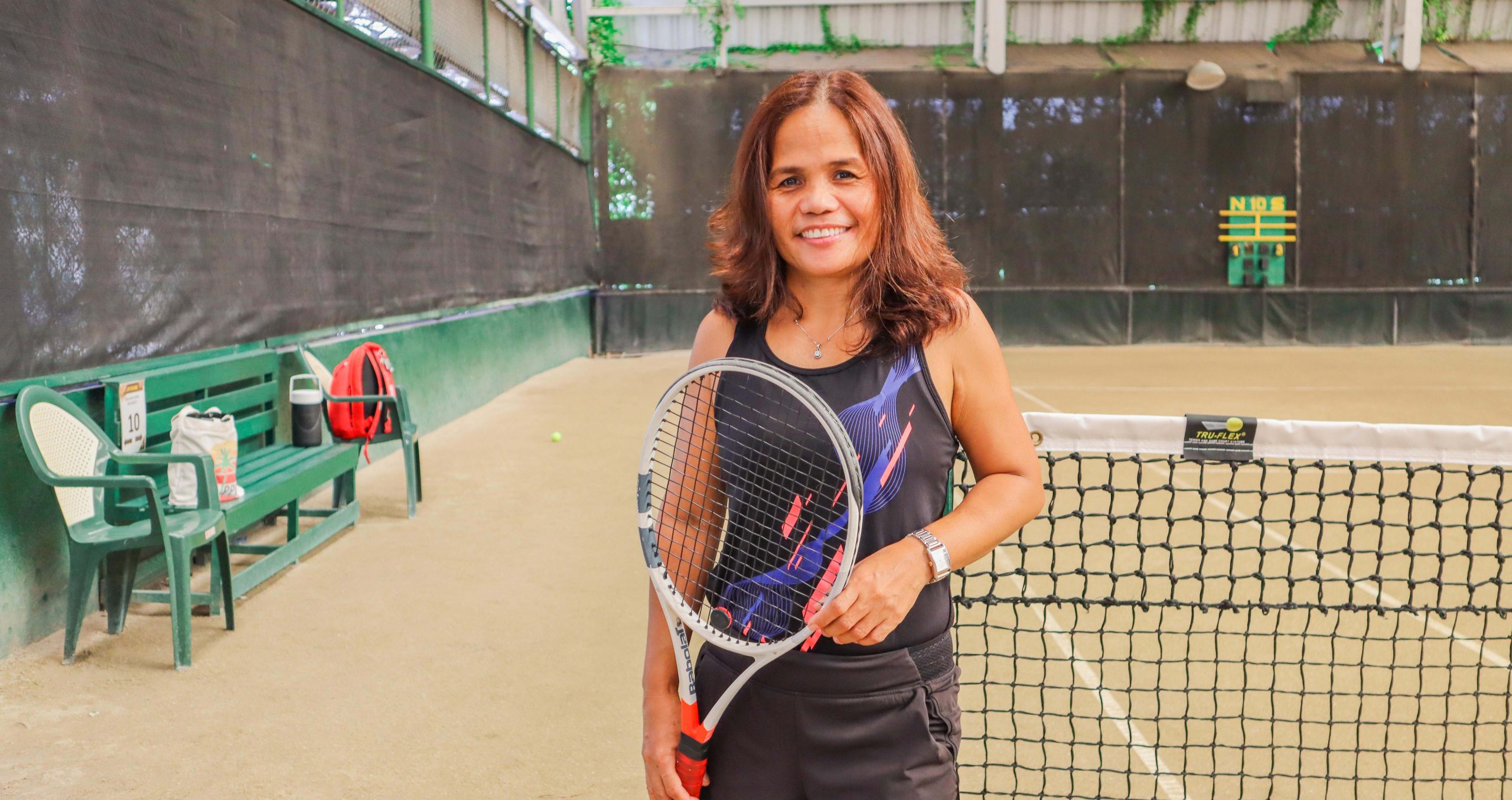29 July 2021
Female coaches may be a common sight in the international tennis world, but they are still rare in the Philippines. Lindy Tantoy is the only woman among the tennis coaches at the Club, and she currently focuses on coaching young children. She comes with four years of professional coaching experience gained in the United Kingdom, and she’s a skilled tennis player, ranking a career-high of 37 in the ITF Senior 40-45 Category in 2015 to 2016.
How old were you when you first picked up a racquet? Do you remember what it felt like to hit the ball with the racquet?
My tennis history is really like rags to riches [story]. I started when I was eight years old as a ball girl, hitting the ball on the wall using my slippers, because I didn’t have a racquet, and my parents couldn’t afford to get me one. I decided to stop that practice because it hurt my hands.
In the province, there weren’t many racquets, and even players had only one racquet. They also do not share because they’re afraid to break the only thing they use for competitions and practices. One day, I was able to borrow one, then I used it to trace a stencil on a piece of wood and cut it to look like a tennis racquet. It looked like a ping pong racquet but bigger. That was my first ever racquet and I used it to hit a ball to the wall until over a year later, there was a coach in the school who saw me playing, and he asked me if I wanted to play for the school. Of course, I said yes because I saw it as a great opportunity. I competed at the regional levels when I was in high school in Surigao del Sur in the 1980s through 1990 representing Region 11 Philippines, and the rest is history!
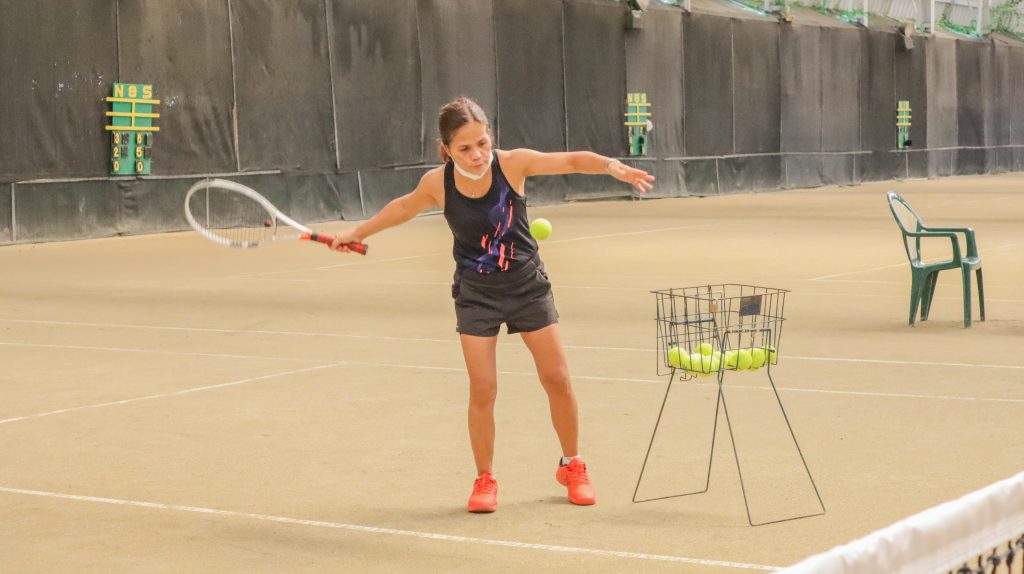
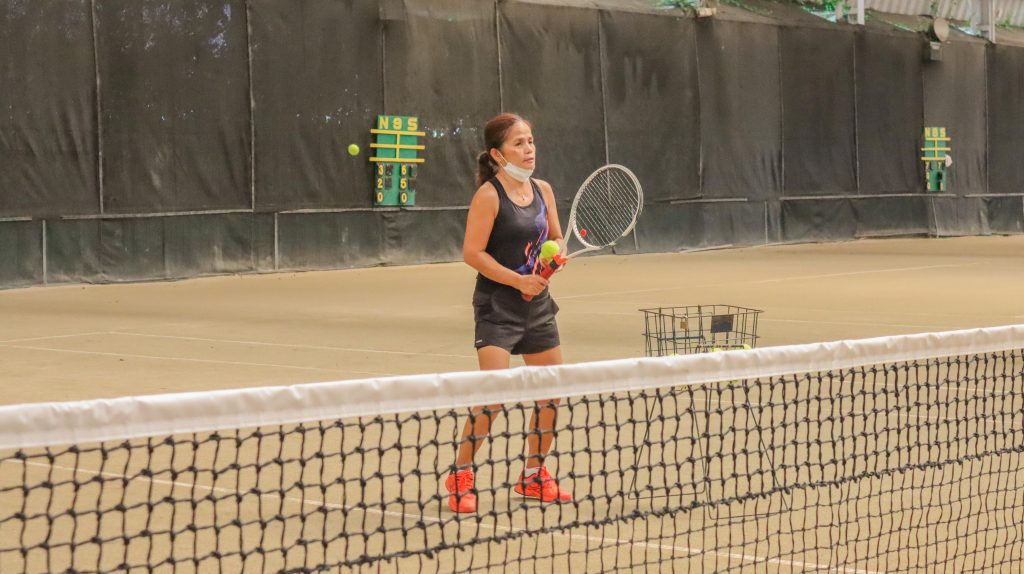
When did you decide that you would pursue a career in tennis?
It wasn’t really a plan. When I got married and had my kids, I stopped playing for a while. It usually takes years for tennis players to decide that they need to come back, pick up a racquet and start playing again.
After I gave birth in 1998, I decided to resume playing but not at a competitive level anymore. I slowly started coaching but only in the village where I lived, at the same time, coaching my own kids in the Laguna area until about 2005.
In retrospect, and since I‘d taken a professional course in the UK for coaching, it wasn’t something that one may classify as proper. It was mainly just feeling, without proper technical coaching.
The main part of my decision to move abroad (UAE then UK) was to work, but I was hoping for an opportunity to play tennis. Luckily, there were plenty of opportunities but mostly [it was] recreational tennis. It helped a lot to grow my game and I was hired as a paid hitting partner but not much on the side of coaching.
After around seven years in the UAE, I decided to move to the UK. When I arrived there, I decided to get back to practicing at a competitive level, playing in the Senior ITF tournaments. After over a year of competing, I decided to get into my coaching career, by taking proper LTA (Lawn Tennis Association) accredited courses. I enrolled for Level 1 in 2015 and finished my Level 3 in 2017. I learned about the UK Coaching style, and that it is a very specific, detailed and scientific approach to learning in a fun way. Coaches are trained to be very creative and knowledgeable, breaking down the coaching into the simplest way a player could understand. Kids’ lessons should always be enjoyable but productive to keep them motivated and engaged throughout the session.
While in the UK, I did encounter some challenges but I know they are part of work, some of which I got over easily, like the British weather and speaking the language of the country, but it took me a while to get used to the surprised reactions I received when parents first encountered a small Filipina as their children’s new tennis coach. However, I was soon able to show them that, irrespective of size or skin [color], I was able to help them reach their tennis goals. As a Filipina professional licensed tennis coach, I was unique in the UK, and we are also not well-known as such elsewhere in the world.
What have been the highlights of that career?
When I was young, here in the Philippines, I was playing at the regional level in the 80s. I represented Region XIII, Surigao del Sur. In the UK, I played in the ITF Senior 40-45 Category in 2015-2016 with a highest ranking of 37.
I played in a lot of tournaments, spending a lot of money because I must book my own hotel, pay for my own food. I spent a lot, but I managed to rank on some and even winning one championship.
In the UK, I have had the opportunity of working in the country’s prestigious National Tennis Centre, seeing and meeting close-up many tennis stars from all over the world, especially in the run-up to Wimbledon; working at the Tennis Academy run by former 1980s UK Ladies’ Number 1 Annabel Croft; and, most of all being the place where I built and developed my coaching ability.
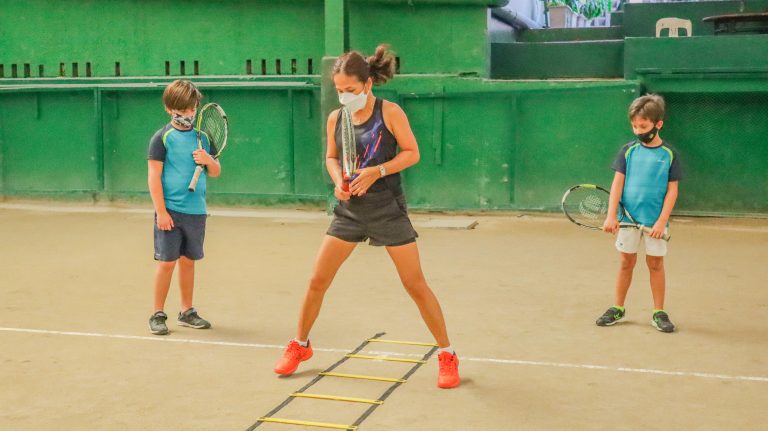
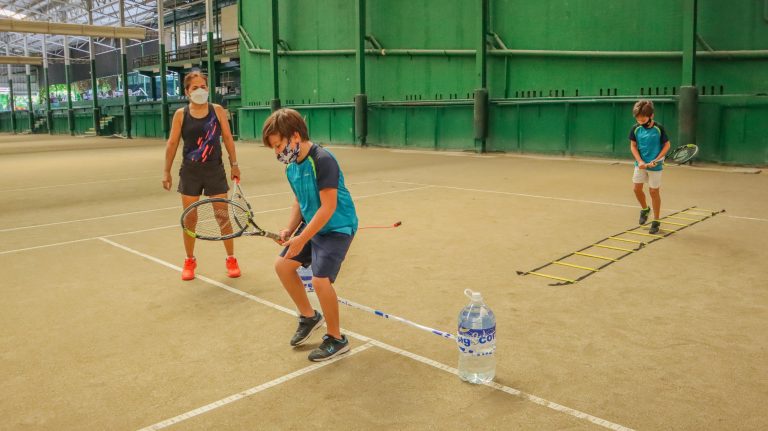
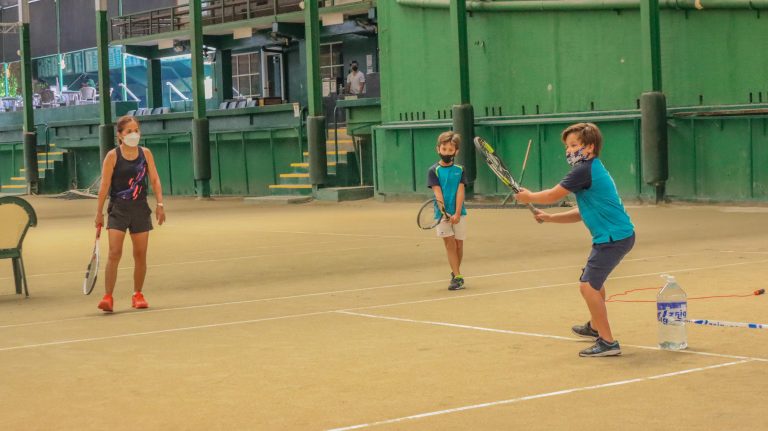
Coach Lindy with her two students, dependents Sean and Frank Murphy
When did you switch to coaching and how did you become a tennis coach at MPC?
We were here in the Philippines in 2018 for a holiday from the UK and there was a tournament at the Club. A friend of mine invited me to an awards night at the Club and that was the night I met Derrick Santos and Carlo Katigbak. I told them I was a coach in the UK and we swapped numbers. I texted Derrick about my qualifications, my experience, and he said, if you’d like to apply at the Club, just go to the Sports and Athletic Office, so I did.
When I first started coaching here, it was only for a month because I needed to go back to the UK, but I said that there might be a chance that I would come back. After six months, in August 2019, I came back, and that’s when I decided to just stay here.
What is it like, being the only female tennis coach at the Club?
In the Philippines, it’s a bit unusual for a woman to be a tennis coach. But overseas, like the UK and the United States, there are loads of women tennis coaches. I am actually a member of the Women’s International Tennis Coaches, and there are at least 3,000-something members from all over the world.
However, in the Philippines, there are only a few because I think this sport is seen more as a male-dominated sport, so there is a little bit of intimidation among the ladies. For me, intimidation only comes when you’re not experienced. If you are not really knowledgeable about what you’re doing, that’s the only way that people can intimidate you, but if you have enough knowledge, they can do nothing.
How do you get women more interested in coaching as a career?
If there are women determined to go through the coaching course, I would recommend it. It is highly recommended to be certified or go for a course. You could be easily intimidated by men if you don’t have enough knowledge. I came from a family with nothing, we were very poor, but my achievements have shown that nothing is impossible.
With determination to change my situation, I have achieved the dreams I had when I was a little kid to play tennis, work abroad and become a Tennis Coach. All challenges become easier when a full determination is applied. So ladies, go for the course, get enough knowledge, and get out on the courts.
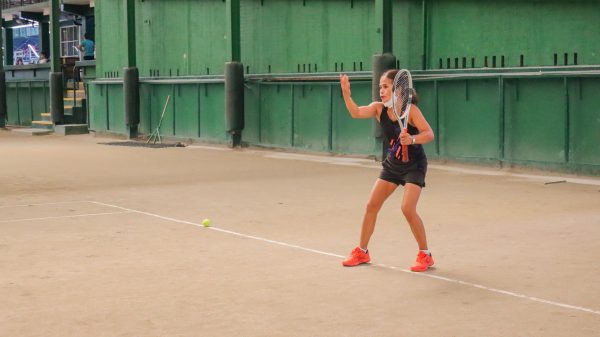
“All challenges become easier when a full determination is applied.”
Are there certain qualities you’ve noticed that tennis champions share? How do you develop those qualities in the players you coach?
Tennis, is not just about physical ability. The biggest part is mental ability. As a coach, I always make sure to train both. They will show you their weaknesses, so as a coach, one must learn to manage those so that they can understand the process of what it means to be a good player someday.
I’m coaching two kids now, so I start with their mental abilities, start to make them tough by ensuring that they work hard and instilling discipline in themselves.
Personally, I believe the key to improving at any type of sport lies in understanding the process, rather than by constantly repeating something incorrect if you don’t understand how to do things better.
A player who has a good understanding of every aspect of the specific stroke they wish to improve is much more likely to achieve progress. Being precise about which aspects to work on and what to do differently is very important, and that is what has helped me to improve and change my game. Having a coach to analyze your game and advise you can also be invaluable.
Venus or Naomi?
In terms of mental toughness, it’s Venus. In physical ability, of course Naomi is still young, she still has to reach her peak. But mentally and the attitude – I’ll go for Venus.
Rafa or Roger?
I like them both, and they’re my top two idols. I sometimes cry when they lose. I can’t choose. But the difference between Rafa and Roger is, Roger plays kind of not to so rough, [he has a] very graceful way of hitting, he’s just saving his energy, not like Rafa, he gets angry, sometimes he goes all the way to the cameras just to get a ball.
Any advice for Alex Eala?
It’s difficult for me to say something because first of all, I haven’t met Alex, I did not see her play when she started.
But I will be one of the many who will continually cheer her on and tell her to keep going: I think she’s doing well at the moment, she’s going to have to push a lot to achieve what she wants to achieve.
I can’t advise on anything technical because in tennis there are many techniques, and if one technique works for one player, it might not necessarily work for another. I wish her all the luck – she might just be number one in the future!


